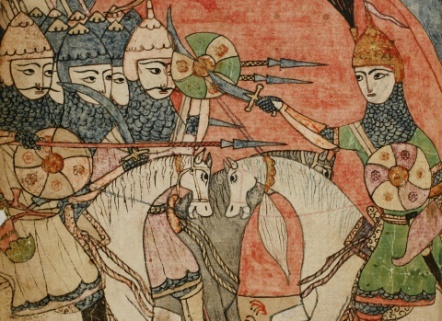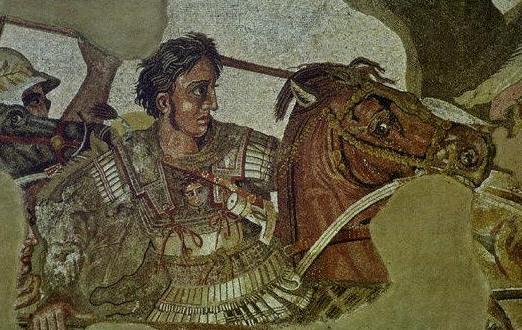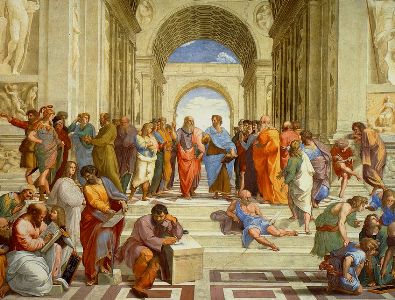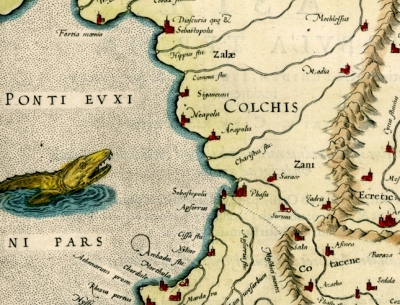

|
The Kartvelologist The Kartvelologist” is a bilingual (Georgian and English) peer-reviewed, academic journal, covering all spheres of Kartvelological scholarship. Along with introducing scholarly novelties in Georgian Studies, it aims at popularization of essays of Georgian researchers on the international level and diffusion of foreign Kartvelological scholarship in Georgian scholarly circles. “The Kartvelologist” issues both in printed and electronic form. In 1993-2009 it came out only in printed form (#1-15). The publisher is the “Centre for Kartvelian Studies” (TSU), financially supported by the “Fund of the Kartvelological School”. In 2011-2013 the journal is financed by Shota Rustaveli National Science Foundation. |
Neoplatonic or Aristotelian: Arabs and Indians as Philosophical Entities in Shota Rustaveli's "The Man in the Panther Skin"
Dionysios posits a supreme being, the One, with an all-encompassing intellect: It understands all. Angels, too, have such an intellect but their intellect is lesser than the intellect of the One. The One understands all because of its all-encompassing intellect but also because It has created all. Angels have a lesser intellect because they have not created the world. Humans have an intellect that is lesser than the Angels, they have a discursive intellect and it is proposed in this paper that Dionysios’ Angels correspond to Rustaveli’s Arabians, who plan and anticipate the results of their actions. Lower than the Humans we find in Dionysios’ hierarchy Animals, whose intellect Dionysios characterizes as sense-perception. An attempt is made in the paper to argue that the Indians in Rustaveli’s poem correspond to the Animals in Dionysios’ hierarchy: the Indians are impulsive and don’t anticipate the consequences of their actions. Dionysios stresses that entities can move between the Angels, Humans and Animals. For example: a Human can acquire an angel-like intellect through philosophical study. Also, an animal-like entity can acquire a human intellect; this is what happens with Tariel: at first he is an impulsive Indian but at the end of the poem he has moved into the class of Dionysios’ Humans, as is shown when he proposed a better plan than Avtandil for the liberation of Nestan-Darejan. keywords:The Man in the Panther Skin, Neoplatonism, Plotinus, Tariel, Avtandil. Category: SCHOLARLY STUDIES Authors: Bert Beynen ON A TYPE OF SUBJUNCTIVE CONDITIONAL IN GEORGIAN
In Modern Georgian, the conditional conjunction tu is occasionally accompanied by a subjunctive verb, instead of an indicative one. The use of the construction is semantically and pragmatically conditioned and is possible in two cases: (i) when the speaker asserts that the protasis content is not true, and (ii) when the apodosis implies a command to the hearer. keywords:conditional sentence, conjunction, subjunctive mood, command Category: SCHOLARLY STUDIES Authors: Yasuhiro Kojima An Old Hebrew Romance of Alexander as One of the Sources for the Conversion of K’art’li
In the Romance the invasion of Iberia by Pompey (in 65 B. C.) appears as the ‘march of Alexander to the land of Afriqi’. Later the Romance served as one of the sources for the Georgian chronicle “The Conversion of K’art’li” (Mok’c’evay K’art’lisay) and the story of Alexander in such confused form entered ancient Georgian historiography as a story about Alexander’s invasion of K’art’li. In the Romance the main names of the kings of K’art’li are: Azo(n) and Arik. The Hebrew Romance contains also the legendary description of two other episodes concerning the battle in Armazi and supposed march of Pompey to Colchis (Egrisi). keywords:Iberia, K’art’li, Azon, Artag Category: SCHOLARLY STUDIES Authors: Constantine B. Lerner Fesach Agada (“Paschal Legend”) and its Significance for Kartvelology
For hundreds of years oral translations of the Scriptures and prayers were created in the vernacular of the Georgian Hebrews. These translations were handed down orally from generation to generation, coming down to us. Text of the Fesach Agada – highly significant for Hebrews - is among them. It tells about the miraculous deliverance of the Hebrews from Egypt and is read in the first night of the festival Fesach (Passover) – dedicated to this event (in the diaspora it is read on the second night as well), at a specially arranged festive meeting. As a rule, Agada was read in the holy language, but under conditions of millennial sojourn of Hebrews in Georgia a large part of Hebrews forgot Hebrew, and the text was incomprehensible to them. Therefore, the spiritual preceptors of Georgian Hebrews apparently decided to translate it into Georgian. Among Georgian Hebrews there presumably existed a ban on writing religious books in Georgian. Hence the translation was made orally. The Agada text acquires special significance both for research into the translations of the Scripture and prayers and the languages and speech of the Hebrews, and for Georgian philology, for this is actually a living text coming down to us from the depth of centuries; it provides rich evidence for both the study of the history of the Georgian schools of translation and (what is more) for research into the history and historical dialectology of the Georgian language, inasmuch as through this text we can trace the process, the dynamics of changes, language layers (e.g. declension of nouns, the relationship of the modifier and the modified, the article, syntactic peculiarities, etc. Especially interesting is the rich vocabulary of the present translation. keywords:Fesach, Passover, Languages of the Jews Category: SCHOLARLY STUDIES Authors: Reuven Enoch
TOWARDS THE RELATION OF RUSTAVELI’S POETIC THEORY TO THE CLASSICAL TRADITION
keywords:Rustaveli on the art of poetry, good / goodness, classical poetic theories, methodological sources, Nicomachean Ethics. Category: SCHOLARLY STUDIES Authors: Zaza Khintibidze COLCHIS IN THE FIRST MILLENNIUM BC: ORIENTAL TRENDS
keywords:Colchis, Mzetamze, Luristan, the Achaemenids, Chibati. Category: SCHOLARLY STUDIES Authors: Vakhtang Licheli |
Categories Journal Archive |




 A Romance of Alexander Mucdon (Macedon) was created in Hebrew, in the 2nd-3rd c. A. D., representing a legendary reflection of the Caucasian campaign of Pompey as it is described in the works by Dio Cassius and Appian.
A Romance of Alexander Mucdon (Macedon) was created in Hebrew, in the 2nd-3rd c. A. D., representing a legendary reflection of the Caucasian campaign of Pompey as it is described in the works by Dio Cassius and Appian. The main purpose of the present study is to argue a new point of view put forth in relation to Rustaveli Studies. In particular, the poetic theory (შაირობის თეორია) from the Prologue to The Man in the Panther’s Skin (MPS) is considered to be Rustaveli’s original conception of aesthetic and simultaneously ethical and philosophical character. Wherein lies the innovative character of Rustaveli’s poetic theory? According to the paper, it lies in the following: poetry in general - i.e. both the process of the creation of an artistic work by the poet, as well as its perception by the listener / reader (შაირობა - shairoba), and the product of this process, the poetical work itself (შაირი - shairi) - is pronounced by the author of the MPS to be goodness (კარგი - kargi), from the poetic and aesthetic standpoint, on the one hand, and from the ethical and philosophical viewpoint, on the other, inasmuch as it is, from the ethical and philosophical standpoint: first of all, 1) the fruit of wisdom, 2) divine, 3) divinely intelligible, 4) highly useful for the listeners; and, also, 5) it is pleasant in this world as well, for a person fit to listen to [poetry]; and as to the poetic and aesthetic standpoint, it is: 1) shortly told, 2) long word. According to the author of the paper, the methodological sources of Rustaveli’s poetic theory are: Plato’s Republic (X, 607d), Aristotle’s Poetics (I, 1447a 9-10; XXVI, 1462b 18) and Nicomachean Ethics, in particular, books VIII and X.
The main purpose of the present study is to argue a new point of view put forth in relation to Rustaveli Studies. In particular, the poetic theory (შაირობის თეორია) from the Prologue to The Man in the Panther’s Skin (MPS) is considered to be Rustaveli’s original conception of aesthetic and simultaneously ethical and philosophical character. Wherein lies the innovative character of Rustaveli’s poetic theory? According to the paper, it lies in the following: poetry in general - i.e. both the process of the creation of an artistic work by the poet, as well as its perception by the listener / reader (შაირობა - shairoba), and the product of this process, the poetical work itself (შაირი - shairi) - is pronounced by the author of the MPS to be goodness (კარგი - kargi), from the poetic and aesthetic standpoint, on the one hand, and from the ethical and philosophical viewpoint, on the other, inasmuch as it is, from the ethical and philosophical standpoint: first of all, 1) the fruit of wisdom, 2) divine, 3) divinely intelligible, 4) highly useful for the listeners; and, also, 5) it is pleasant in this world as well, for a person fit to listen to [poetry]; and as to the poetic and aesthetic standpoint, it is: 1) shortly told, 2) long word. According to the author of the paper, the methodological sources of Rustaveli’s poetic theory are: Plato’s Republic (X, 607d), Aristotle’s Poetics (I, 1447a 9-10; XXVI, 1462b 18) and Nicomachean Ethics, in particular, books VIII and X. Oriental impulses are already felt in Colchian culture of the early 1st millennium BC., which, as is known, is attested by the Hasanlu-type daggers (T. Mikeladze). Similar impulses are seen in South Georgia where a dagger, apparently made in Luristan and typical of Calmayer 31-35 (Neo-Babylonian) burials of the 7th-6th c (Mzetamze), has been discovered. The same possibility is underlined by the fact of placing shin rings in the burial which, besides Georgia, is attested in Luristan as well. In the Achaemenid period the territory of present-day Colchis was divided into two parts: the territory of the Colchian kingdom proper, south of the Rioni river (G. Melikishvili), addressed entirely to the Greek world, and Shida Kartli, more or less oriented to the Achaemenid world (O. Lordkipanidze), hence the Achaemenid or “Achaemenized” import and traditions are concentrated here. However, more westward, in v. Chibati, a bronze Achaemenid bit was found by chance, the artistic level of its execution is quite exceptional (the 5th-4th c BC.). The western boundary of Achaemenid interests in the Caucasus is the line joining Sairkhe – Vani – Atsquri - r. Chorokhi. Weak Achaemenid traditions are preserved at Vani of the turn of the 4th-3rd c BC, while from the 3rd c BC, rather weak Hellenistic influence is attested to over the entire territory of Colchis (barring the Hellenized cities of Vani and Eshera).
Oriental impulses are already felt in Colchian culture of the early 1st millennium BC., which, as is known, is attested by the Hasanlu-type daggers (T. Mikeladze). Similar impulses are seen in South Georgia where a dagger, apparently made in Luristan and typical of Calmayer 31-35 (Neo-Babylonian) burials of the 7th-6th c (Mzetamze), has been discovered. The same possibility is underlined by the fact of placing shin rings in the burial which, besides Georgia, is attested in Luristan as well. In the Achaemenid period the territory of present-day Colchis was divided into two parts: the territory of the Colchian kingdom proper, south of the Rioni river (G. Melikishvili), addressed entirely to the Greek world, and Shida Kartli, more or less oriented to the Achaemenid world (O. Lordkipanidze), hence the Achaemenid or “Achaemenized” import and traditions are concentrated here. However, more westward, in v. Chibati, a bronze Achaemenid bit was found by chance, the artistic level of its execution is quite exceptional (the 5th-4th c BC.). The western boundary of Achaemenid interests in the Caucasus is the line joining Sairkhe – Vani – Atsquri - r. Chorokhi. Weak Achaemenid traditions are preserved at Vani of the turn of the 4th-3rd c BC, while from the 3rd c BC, rather weak Hellenistic influence is attested to over the entire territory of Colchis (barring the Hellenized cities of Vani and Eshera).